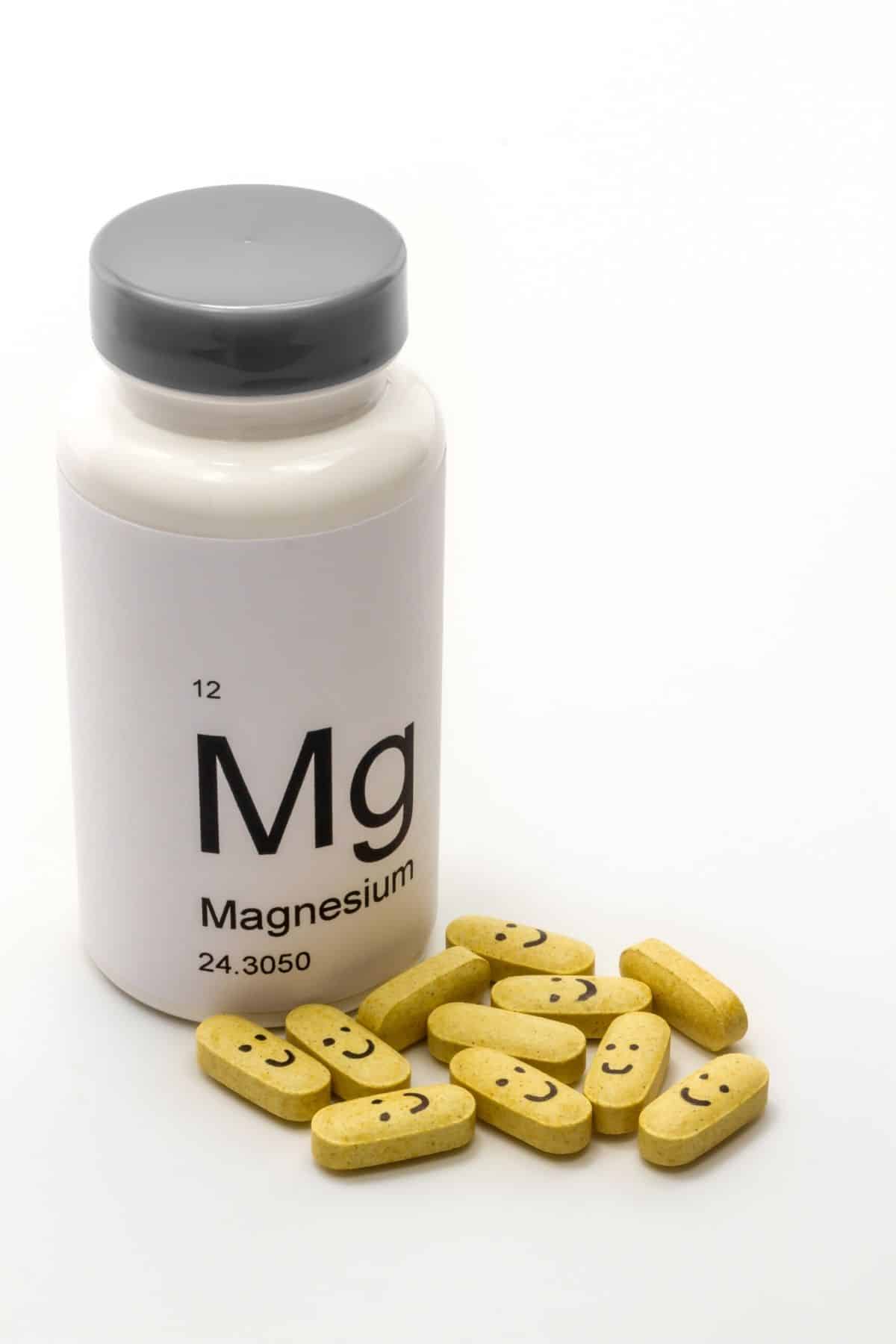Different Types of Magnesium (How to Choose)
Magnesium is a mineral that is essential to the body. It helps with everything from energy production to relaxing the muscles. There are many different types of magnesium supplements on the market, so it can be tricky to figure out which one is right for you. In this blog post, we will discuss the different types of magnesium, food sources of magnesium, and how to choose the right one for you.

Magnesium is the second most abundant element inside of human cells. It serves hundreds of functions and so the body needs it in large amounts. Magnesium powers over 300 enzyme-driven biochemical functions on a constant basis. It serves as a source of energy, powering ATP molecules and mitochondria.
Magnesium also provides structural support for the body and regulates many bodily functions such as muscle relaxation. It aids in glucose and fat breakdown. It helps produce proteins, enzymes and antioxidants. It assists in the creation and repair of DNA and RNA. Magnesium also helps regulate cholesterol.
Since magnesium is so vital to so many different functions, you can imagine that being deficient in a mineral as necessary as magnesium can have detrimental effects on the way our bodies function, including symptoms such as PMS, migraines, and anxiety (just to name a few).
Magnesium Deficiency
Magnesium deficiency is one of the leading deficiencies in adults. Even if we eat a whole foods diet, our soil is now quite deficient in magnesium and other minerals.
Being on certain prescription drugs can also lead to a magnesium deficiency. Proton pump inhibitors can make it nearly impossible for those who are on it to properly absorb magnesium from their diet. Diuretics, painkillers and certain steroids can also have a negative impact on magnesium absorption.
Drinking caffeinated beverages, sugary juices, alcohol and soda on a regular basis can deplete our bodies of magnesium or block its absorption. These beverages all have a diuretic effect on our bodies, which results in a quick loss of magnesium through our urine before it can be absorbed.
Lastly, magnesium deficiency can be caused from taking birth control pills and from having digestive problems such as leaky gut or celiac disease that might cause the body to not absorb it as well.
Signs of Deficiency
Magnesium is required for hundreds of enzyme-driven biochemical functions within the body.
Early signs of magnesium deficiency include:
- muscle cramps
- irritability
- sugar cravings
- brain fog
- dizziness
- sleep problems and
- fatigue
More serious problems that develop due to a lack of magnesium include hypertension, poor digestion, artery calcification, PMS, temporomandibular joint syndrome (TMJ), mental health disorders such as anxiety and depression, fibromyalgia, hormone imbalances, migraines, fertility problems, pregnancy complications, osteoporosis and more.
Of course, if you are experiencing any of these symptoms or issues, it is important to check with your healthcare provider.
Foods Rich in Magnesium
In order to remedy magnesium deficiency in our bodies, we can focus on consuming foods rich in this mineral. Some magnesium-rich foods include:
- spinach
- Swiss chard
- pumpkin seeds
- almonds
- avocados
- bananas
- raw cacao or dark chocolate with an 85% or higher cacao content
It’s important to heal the gut and aim for optimal digestion as well so that magnesium and other nutrients can be absorbed and used properly.
It’s also a good idea to consider buying organic foods as much as possible as well because crops sprayed with glyphosate can disrupt magnesium absorption. See my tips on how to eat more organically.
You might consider some of these magnesium-rich recipes to help increase your levels:

Supplementing with Magnesium
When dietary magnesium isn’t enough, and it rarely is these days, consider taking a magnesium supplement to ensure that you’re getting a good amount of this important mineral.
There are a few different types of magnesium and finding the right one for your situation is important.
Let’s take a closer look at the different types of magnesium and what they are generally used for.

For specific dosing recommendations, I like to refer to Dr. Aviva Romm’s article about magnesium supplements for women. But, you should also consult your healthcare provider if you suspect a magnesium deficiency and plan to start supplementing with magnesium.
There are a few contraindications to taking it that you can discuss with your provider and will help determine which version is right for your specific situation.
Different Types of Magnesium
1. Magnesium Citrate
This type of magnesium contains citric acid and is often used as a mild laxative. Small doses can be used to correct restlessness as well. This is the main source of magnesium in the popular supplement powders like Calm and can have a relaxing effect on our nerves.
But, too much magnesium citrate can cause diarrhea. So, be cautious of the dosage. Magnesium citrate is generally recommended for those who are suffering from constipation.

2. Magnesium Glycinate
Magnesium glycerinate is a chelated form of magnesium that is easily absorbed. It generally provides the highest level of bioavailability due to its higher absorption rate.
Magnesium glycinate is the type most often recommended for those who are trying to remedy a general magnesium deficiency. It can also be helpful in calming the nerves, relaxing the muscles and decreasing the chances of migraines. It is currently being studied in gut healing therapies.
This type of magnesium is also on my lists for the best vitamins for teenage girl, supplements for women over 30, and supplements for women over 50.
3. Magnesium Oxide
Magnesium oxide is a non-chelated form of magnesium bound to an organic acid or a fatty acid.
It also has a mild laxative effect. Some healthcare providers may recommend that you take it in small doses throughout the day if you are constipated.
4. Magnesium Malate
Magnesium malate is the type of magnesium that is often recommended for people trying to correct or prevent heart disease. This form can be energizing and can also benefit those who suffer from fibromyalgia and muscle cramps.
5. Magnesium Chloride
Magnesium chloride only contains about 12% magnesium but is better absorbed than other forms. It is used for detoxification, improving metabolic functions, and kidney function support.
6. Magnesium Taurate
Magnesium taurate is a combination of magnesium and the amino acid taurine. Together, they tend to have a calming effect on the body. Magnesium taurate is generally used for cardiovascular health.
7. Magnesium L-Threonate
Magnesium L-Threonate has shown promising benefits for those who have anxiety, depression, post traumatic stress disorder, and other mental health and brain disorders.
Magnesium threonate is easily able to penetrate the mitochondrial membrane and is easily absorbed since it can cross the blood-brain barrier.
Other Types of Magnesium
In addition to these over-the-counter forms of magnesium supplements, you can also find on the market topical creams, oils, and flakes for taking baths.
Again, it’s usually best to consult with your healthcare provider to determine the best type and dosage of magnesium supplementation for your specific situation.

FAQs
Studies have shown that most people do not meed the recommended daily intake for magnesium and that most people would benefit from supplementing with magnesium.
You may be taking too much or taking the wrong type of magnesium. Try magnesium glycinate which does not usually affect the gastrointestinal system as much. Speak to your doctor if the diarrhea persists.
It can depend on what type of magnesium you wish to take. My favorite type and brand is Pure Encapsulations Magnesium Glycinate.
Conclusions
Magnesium is a mineral that is essential to the body and has many benefits. There are many different types of magnesium supplements on the market, so it can be tricky to figure out which one is right for you.
In this blog post, we have discussed the different types of magnesium, food sources of magnesium, and how to choose the right one for you. Do your own research to find out which type of magnesium is best for you and consult with a healthcare professional if you have any questions.
Don’t forget to join my newsletter list to get exclusive clean eating recipes and tips. The newsletter is 100% free with no spam; unsubscribe anytime.
About the Author: Carrie Forrest has a master’s degree in public health with a specialty in nutrition. She is a top wellness and food blogger with nearly 10 million annual visitors to her site. Carrie has an incredible story of recovery from chronic illness and is passionate about helping other women transform their health. Send Carrie a message through her contact form.
Note: this post is for informational purposes only and is not intended as medical advice. Please consult your healthcare provider for recommendations related to your individual situation.

















When do you take your magnesium? I see
You take two kinds. Do you take them at same
Time or one in am and one in pm? Thank you.
Great question! You can take them together or separately. I would take them with food though, so after meals.
Great overview on magnesium! I’ve personally had great results with Magnesium Glycinate for anxiety. It absorbs well and doesn’t lead to the same laxative side effects some of the other supplements have.
I have recently started taking magnesium glycinate and the headaches and fatigue I am experiencing is crazy.
Is there anything that can be done about this, its debilitating.
The headaches and fatigue started with the magnesium? If so, try stopping it. If your fatigue and headaches continue, it’s best to consult a qualified healthcare practitioner.
Bookmarking this article because I love reading about vitamins and minerals. Its essential… and I don’t know enough about Magnesium lol
I had no idea about the benefits of magnesium. I suffer from anxiety and my PMS is seriously unruly most times. I definitely need to look into this.
This is a really interesting post! I didn’t know that magnesium could help so much with menstration and the symtoms of it. I’ll definitely have to look more into this, thanks for sharing!
This is such powerful and helpful information. I had no idea that magnesium was that beneficial.
Wow amazing guide on the benefits. I keep hearing the great things magnesium can do, especially for pms. A few friends take them and they swear by it.